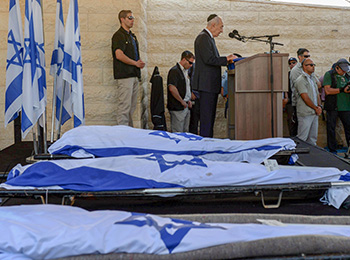Sweat ran down the sides of our faces and necks. There was no shade in which to rest at the Modi’in Cemetery, where Naftali Frenkel, Gilad Shaar and Eyal Yifrach soon would be buried side by side.
The bodies of the three kidnapped Israeli teens had been found the day before – June 30, the last day of school. So instead of celebrating summer vacation and, coincidently, Canada Day, our Toronto-born daughters were with their parents in a cemetery.
We were not alone. Tens of thousands of mourners had come from around the country.
The media and VIPs and those who arrived very early sat under huge blue tarps. The rest of us stood packed together with no room even to sit on the ground. It was OK; we were there to be together and to show the Frenkel, Shaar and Yifrach families that Am Israel was grieving with them.
Separate funeral services had been held earlier in the day in the home communities of each boy. A request to bury the boys on Har Herzl had been denied. The three boys were not fallen soldiers. They were civilians. That is why their kidnapping and murder was especially painful and shocking; they could have been anyone’s children.
It was agreed that the three should be buried together.
Buses full of mourners came from Petach Tikvah in the centre, Elon Moreh in the Shomron, Tekoa in Yehuda, Keshet in the Golan and Be’er Sheva in the Negev. Despite across-the-board support for the boys’ families during the 18-day search effort, the Dati Leumi (national religious) contingent was by far the largest attending this burial service.
In front of us stood a young man wearing a black T-shirt with the now-hopeless hashtag #BringBackOurBoys. Next to him was a woman who had grown faint from the heat. At least three times we heard the call “chovesh” to summon a medic’s assistance. Police opened boxes of water and asked people in the crowd to pass the bottles forward to those who needed something to drink.
By now, it was clear that the burial service was not going to start at 5:30 p.m. as scheduled – if for no other reason than because thousands of people were still making their way up the hill. My daughter wearily asked, “Next time, can we not come?” She was tired and hungry and by then missing her classmate’s bat mitzvah party. I could only answer that I hoped there would not be a next time and reminded her that we could stand a little discomfort in order to help comfort the boys’ families.
Here and there people sung softly, offering spontaneous prayers like Ani Ma’amin (I Believe). The sound moved like a soft breeze from one part of the crowd to another before slowing quietly. And then it would begin gently again. The air started to cool as the sun drew lower in the sky.
A vehicle arrived with the first body. Moments later, the second vehicle came. A long wait preceded the arrival of the last vehicle. The service began after the flag-draped bodies were set side by side and the families seated.
My heart broke as the three fathers together said Kaddish for their boys who were not coming back. The crowd tearfully answered the call-and-response and ended with “Amen.”
The eulogies were over quickly, and the crowds were told that they could go to the graves only after the families had left. The politicians were to hold a cabinet meeting that evening to determine the next step in the hunt for the suspected killers, believed to be operatives of Hamas.
It was past 11:30 p.m. when we got home. I fell asleep quickly and deeply. When I woke up, my first instinct was to ask my husband, who always gets out of bed before me, if there was any news about the boys. For almost three weeks, I had awoken each day anxiously hopeful that overnight they had been found alive.
Then I remembered what day it was: the day after the three funerals. My mind turned to the families, imagining how they might be waking up in a similarly hopeful haze … before they, too, became fully aware. How tired they must be.
And so, on the second day of what might prove to be a summer of blazing tension, I was left with one question: How will we go forward?
Alison Epstein made aliyah from Toronto in 2005 with her husband, Stephen, and their daughters. They live in Rehovot.
